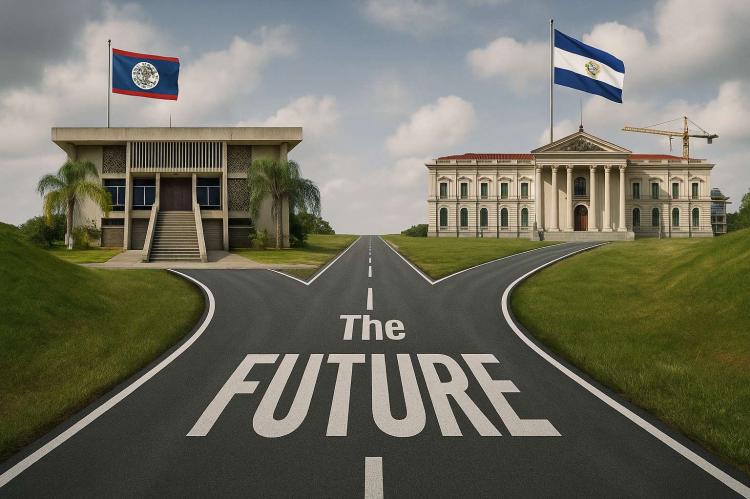Bukele’s El Salvador vs. Belize’s Colonial Democracy: Why System Change – Not a Strongman – Is Belize’s Real Future
By: Omar Silva I Editor /Publisher
National Perspective Belize I Digital 2025
Belize City: Sunday 3rd August 2025
When Nayib Bukele swept to power in El Salvador in 2019, few imagined that in just five years he would become the region’s most controversial—and, for some, most admired—leader. Today, Bukele is hailed by many Salvadorans for crushing gangs and wooing billions in Chinese investment. Yet he is also condemned for gutting the constitution, ruling under an indefinite “State of Exception,” and removing presidential term limits to pave his way for indefinite re-election.
Here in Belize, social media is ablaze with divided opinions. Some Belizeans praise Bukele, saying, “He’s the best president ever—we need someone like him.” Others condemn him as an authoritarian in the making, even comparing him to African dictator Idi Amin Dada.
But beneath the debate lies a bigger question: Do Belizeans even understand the difference between our system and Bukele’s—and what it would actually mean to copy his model?
El Salvador Before Bukele: Debt, Despair & the China Pivot
Before Bukele, El Salvador was drowning:
- Gang violence was rampant—one of the highest homicide rates in the world.
- Debt was crushing—by 2017, public debt hovered around 70% of GDP.
- Infrastructure and investment were stagnant.
In 2018, El Salvador broke ties with Taiwan and switched allegiance to China—a move Bukele later embraced. Beijing stepped in with promises worth US$500 million to $2 billion, including:
- A gleaming new National Library
- A national stadium
- Water treatment projects and port development
These projects helped Bukele rebrand El Salvador as a “nation on the rise.”
But the makeover came with a price: Bukele consolidated power, undermined democratic safeguards, and created what critics call a modern “caudillo” presidency.
👑 Bukele’s Power Grab
Bukele has:
- Ruled under a State of Exception since March 2022, suspending basic rights like due process, freedom of assembly, and privacy.
- Purged the Constitutional Court, replacing judges with loyalists who reinterpreted the constitution to allow immediate re-election.
- Used his party’s supermajority in Congress to extend presidential terms from five to six years and eliminate term limits entirely.
In effect, Bukele can now run indefinitely—and openly hints he might.
Belize’s Westminster Model: A Colonial Hand-Me-Down
Belize is still operating on the Westminster parliamentary system—a British import. Here’s how it works:
- Belizeans vote for Area Representatives (MPs).
- The party with the majority of MPs selects the Prime Minister.
- The Head of State is still, technically, the King of England (represented by the Governor-General).
This means Belizeans do not elect their Prime Minister directly. Instead, party elites decide who leads after the election—a system rooted in colonial governance, not modern democratic ideals.
🔍 The Double Standard: Term Limits & Broken Representation
Belizeans slam Bukele for removing presidential term limits. But here’s the truth:
- Belize has no term limits—for anyone.
Area Representatives can run forever. Some have sat in the House for 30 or 40 years.
- Belize’s constituency sizes are wildly unequal:
- Stann Creek West has 10,446 voters.
- Mesopotamia has just 2,237 voters.
A vote in Mesopotamia counts almost 5 times more than one in Stann Creek West. That’s not just undemocratic—it’s unjust.
Yet Belizeans rarely demand reform on these issues.
🔄 Why Belize Can’t Just “Do a Bukele”
For Belize to have a Bukele-style “strongman president,” we would need to rip out our current system by the roots:
- A referendum would have to rewrite the Constitution, moving from a Westminster parliamentary monarchy to a Republican presidential system.
Belizeans would have to decide:
- Should we have a directly elected President as Head of State & Government?
- What powers would Parliament retain—or would we adopt a Congress?
- Who appoints judges? Who controls the security forces?
This isn’t “adjusting” the system—it’s tearing down and rebuilding our entire framework of government.
⚖️ The Deeper Problem: The Colonial Mindset
Here’s the uncomfortable truth: Belize’s problem isn’t that we lack a “Bukele.” Our problem is that we are still chained to a colonial-era system—and the colonial mindset that goes with it.
- Our candidates are chosen by party elites, not the people.
- Our politics is fueled by dependency—on foreign aid, on imported goods, on systems we didn’t design.
- Our economy remains trapped in exporting raw commodities instead of manufacturing and value-added production.
We keep recycling the same PUP and UDP figures—products of the same colonial mold—expecting different results.
🚀 The FUTURE Belize Needs
If Belize truly wants transformation—not just another “strongman”—we need:
✅ A new Constitution that ends the colonial framework.
✅ Directly elected leaders with clear term limits.
✅ Constituency equality—so every vote counts the same.
✅ Candidates chosen by the people, not party elites.
✅ An economy built on manufacturing, industry, and exports—not dependency.
This isn’t about importing Bukele’s style. It’s about creating a Belizean model for the future—one that is regenerative, transformational, and focused on economic independence.
✅ BOTTOM LINE
Bukele is popular, yes. He’s effective, yes. But he’s also dismantling the very democratic safeguards that protect citizens from absolute power.
Belize doesn’t need its own Bukele. Belize needs systemic reform—an end to colonial governance, an overhaul of how we elect and hold leaders accountable, and a vision for an economically independent Belize.
Only then will we stop recycling yesterday’s politics—and finally step into the FUTURE.
- Log in to post comments

